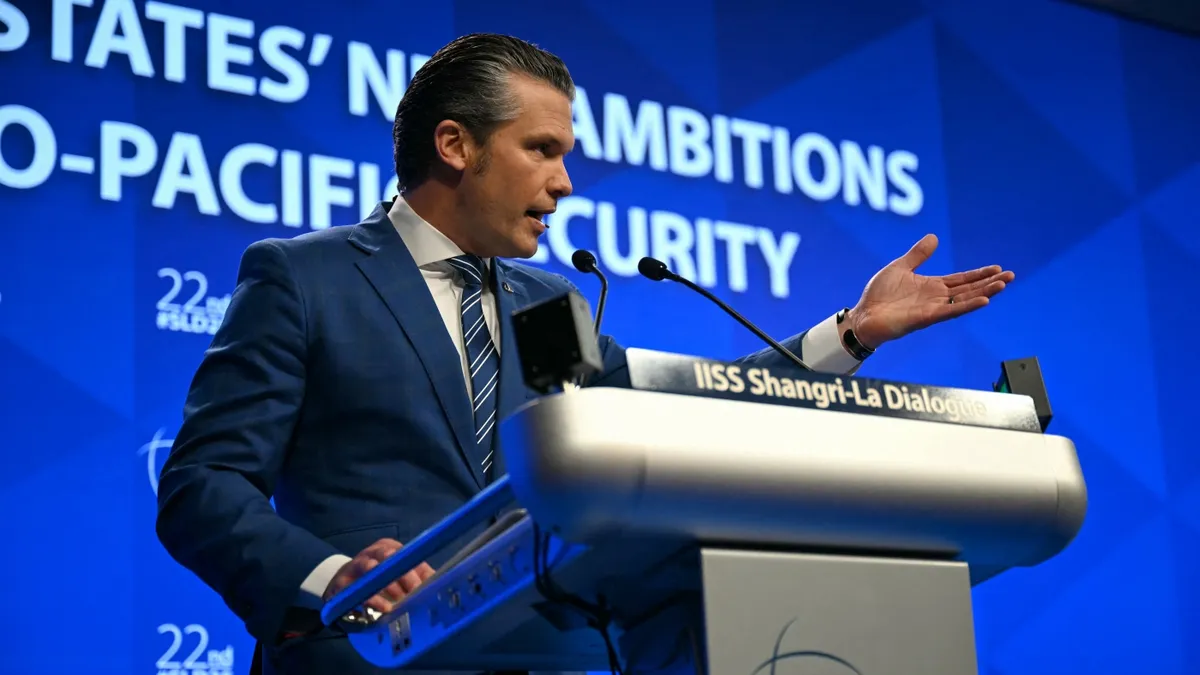
SINGAPORE — In a significant address at the annual Shangri-La Dialogue, Asia's foremost defense summit, U.S. Defense Secretary Pete Hegseth delivered a stark warning regarding the increasing threat posed by China to the stability of the Asian region. Hegseth emphasized that the United States is strategically refocusing its strength and policies with the primary goal of deterring Chinese aggression. He urged China's neighbors and U.S. allies to join forces in this critical endeavor.
Hegseth stressed the necessity for all nations to recognize that Beijing is credibly preparing to potentially employ military force to alter the existing balance of power in the Indo-Pacific. This statement was directed at both civilian and military officials, highlighting the urgency of the situation. He reiterated that the U.S. does not seek conflict, nor does it aim to dominate or provoke China. “We do not seek regime change,” Hegseth insisted, echoing reassurances made by previous U.S. administrations to the Chinese government.
However, the response from retired Chinese Senior Colonel Zhou Bo, now a senior fellow at the Center for International Security and Strategy at Tsinghua University, indicated a perception of increased hostility in Hegseth's remarks. Zhou noted that this speech appeared more confrontational than those delivered by past U.S. officials at the Shangri-La Dialogue and suggested it was infused with an ideological rivalry. He questioned the sincerity of Hegseth’s claims, contrasting them with Vice President Vance's critical comments made earlier at the Munich Security Conference.
In his speech, Hegseth stated that the U.S. is reorienting its military posture specifically to deter the aggression of Communist China. One potential consequence of this shift could be a reevaluation of the presence of approximately 28,500 U.S. troops stationed in South Korea, particularly in light of any conflict that may arise between mainland China and Taiwan, which the Pentagon regards as its primary strategic concern.
Although the Pentagon has asserted that there are no immediate plans to withdraw forces from South Korea, it emphasized the need for strategic flexibility in troop deployment. This could lead to divergent interests between the U.S. and South Korea, which primarily views its threats as stemming from North Korea. Zack Cooper, a senior fellow at the American Enterprise Institute, noted that a change in U.S. military posture on the Korean Peninsula is likely, reflecting a broader shift in focus toward China.
Hegseth's remarks echoed the America First rhetoric championed by former President Trump, as he criticized the Biden administration's defense policies as ineffective. He praised Trump's negotiation skills and his efforts to secure U.S. borders against illegal immigration. “We are not here to pressure other countries to adopt our politics or ideology,” Hegseth stated, acknowledging the complex economic relationships Asian nations have with China while cautioning against the leverage that the Chinese Communist Party (CCP) seeks through economic entanglement.
Malaysia's Prime Minister Anwar Ibrahim responded by asserting his country’s commitment to remaining non-aligned, advocating against major powers exerting their influence in the region. He expressed the necessity for a dynamic equilibrium in Southeast Asia that facilitates cooperation without coercion and maintains balance without resorting to bloc politics.
During the forum, French President Emmanuel Macron offered a critique of U.S. policies, urging countries to maintain strategic autonomy amidst the escalating U.S.-China rivalry. Macron emphasized the importance of cooperation while rejecting any notion of being dictated to by a single leader, implicitly referencing Trump. He also highlighted the inconsistency of the U.S. approach regarding Taiwan—a self-governing island claimed by China—while drawing a parallel to the situation in Ukraine, arguing that such double standards could undermine U.S. credibility.
In response, China's embassy in Singapore criticized the comparison between Taiwan and Ukraine, asserting that the Taiwan issue is an internal matter for China and that employing double standards in international relations is unacceptable. The embassy's comments underscored the ongoing complexity of geopolitical tensions in the region.